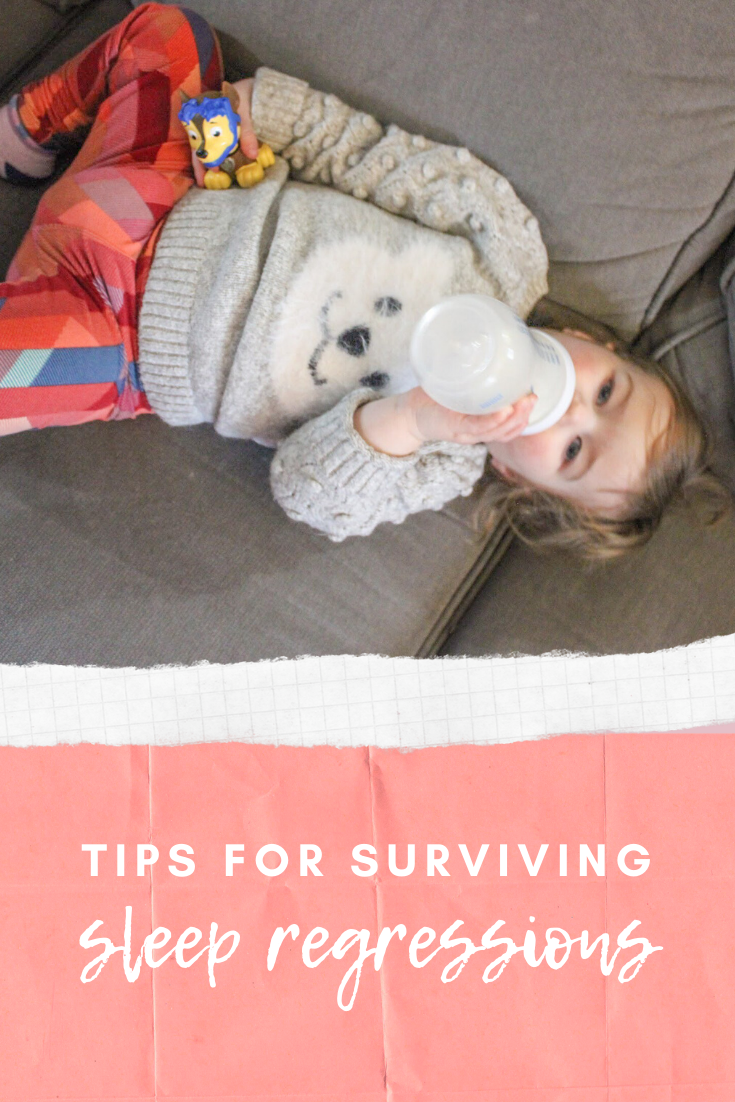Sleep and regression. Two words that go together like oil and vinegar. Also see, every parent’s worst nightmare. But have no fear, check out these tips for surviving a sleep regression.
I should preface this post by saying our two daughters are two VERY different sleepers. Our oldest (now almost 4) was an amazing sleeper from day one. She set the bar high in the sleep department, and we knew that. Once we welcomed baby number two, we knew we were doomed. Sleep would not be in our cards. And man oh man, were we right.
For those unfamiliar with sleep regressions, it is typically a period of time when a little one, who was previously sleeping well, experiences a temporary setback in sleep patterns. During a regression, they will go from sleeping soundly to waking up frequently during the night, are harder to calm or settle before sleep, wake up early from naps, or fight nap times altogether. In many cases, it’s a combination of all three – which can be extremely exhausting and frustrating for parents. The most common time frames for sleep regression to occur are when baby hits 4 months, 9 months, and 18 months of age.
We recently hit the 18 month regression. Also probably the worst. Why? Because baby (or should I say, toddler) now knows what she wants and when she wants it. And she can vocalize it. Add in teething and some serious separation anxiety, and we’ve got one hot mess.
Did I mention that sleep regressions can also last up to SIX weeks? Yep, you read that right. When you’re running on little sleep, six weeks can feel like an eternity.
BUT, fear not. You will get through it. While there is no secret recipe to “fix” any sleep regression, there are ways to minimize the sleepiness, for both baby and yourself. From parent to parent, here are my tips for surviving a sleep regression.
Tips for Surviving a Sleep Regression
Consistency. Try to stick to the routine. Remember that this is a confusing and probably overwhelming time for your little one too. Even though sleep regressions are bound to mess up your usual schedule, you should try to keep up your nap and bedtime routines. It may not happen when it normally does, but in a time where your baby is experiencing and learning new things, it helps to keep some things familiar.
Comfort. During this time, baby will likely be more clingy. Providing comfort items to help them calm is key. Items such as a stuffed animal, blanket or bottle.
Our youngest, Berkley, has really taken a liking to her blanket. Philips Avent Natural Bottles are also always on hand in our house. These BPA-free bottles have an ergonomic shape for maximum comfort, making them easy to hold and grip in any direction. The ultra soft nipple more closely resembles the breast, making an easier transition from breast to bottle.
Support. Does baby seem hungrier than normal? Don’t be afraid to give your baby those extra feedings or snacks. The developmental changes and growth spurts that your baby often experiences during a sleep regression will usually increase their appetite.
Ask for help. This one may be hard, but it is important. While you do your best to take care of your baby during sleep regressions, remember to take care of yourself too. Sleep regression for baby often leads to sleep deprivation for parents. If you’re able to, take shifts with your partner. You can’t be the best for your babe if you don’t take care of yourself first.
All kids are different. Some go through it, some don’t. Some go through it early, some go through it late. Saying sleep regressions happen at months x, y and z is not set in stone. All kids are different.
Remember, it will pass. When you’re going through it, you may wish time to move faster. But remember, you will get through it. It won’t last forever. It doesn’t mean all hope is lost and you will never sleep again.Time is already such a thief, don’t wish it away any faster. Remember and cherish these moments, despite how terrible you may feel at the time.







